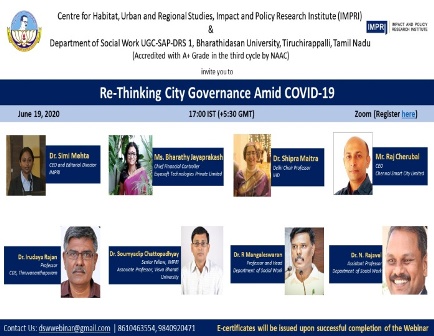COVID-19 Crisis in Cities: Re-thinking City Governance Must
The role of municipalities in the COVID-19 pandemic is very crucial and with less resource available they cannot bring effective results.
Migrant and local workers in cities across India are severely affected by the global pandemic COVID-19. Their lives and livelihood may get harder, if effective and pragmatic steps are not undertaken. Considering the gravity of the ongoing crisis, central and state governments need engage with city governments so that they can effectively intervene to improve the plight of millions of migrants and other workers in the informal sector.
“Resources, finances and capacity building of municipalities are required to help them work for migrant workers in cities”, said Prof. Shipra Maitra, Delhi Chair Professor, Institute of Human Development, New Delhi. She added that the role of municipalities in the COVID-19 pandemic is very crucial and with less resource available they cannot bring effective results. Municipalities have to work for every needy out there in their city limits, who are searching for food and livelihood opportunity. Mid-day meals should be given to all who are needy with the help of supply agencies in the cities and around. Prof. Maitra was addressing the webinar on “Re-thinking City Governance Amid COVID-19, with special reference to the Migrant Labour crisis” organised by the Centre for Habitat, Urban and Regional Studies (CHURS), Impact and Policy Research Institute (IMPRI), New Delhi in association with Department of Social Work, Bharathidasan University, Tiruchirappalli, Tamil Nadu, on 19 June 2020.

Even after 25 years of the 74th Constitutional Amendment Act, which provides recognition to city governments by devolution of power and function, it is not being followed by many states in India, said Dr Soumyadip Chattopadhyay, Senior Fellow, IMPRI, and Associate Professor, Viswa Bharti University, West Bengal.
The 12th Schedule of 74th Constitutional Amendment Act mandates 18 functions to be devolved to the city governments.
However, not a single city government has control over all 18 functions. Ambiguities in defining the roles, relationships and hierarchy of Special Purpose Vehicles (SPVs) with the urban local bodies have resulted in poor deliveries. Dr Chattopadhyay shared that urban local bodies are trapped in a vicious circle where paucity of resources leads to poor service delivery, and thus poor revenue generation. It is important to identify the functions of municipalities and the weak financial health of city governments. He opined that empowering city government is not a choice, but a necessity in the current situation of pandemic. Further, he proposed 3Fs—Functions, Forms and Functionaries— for effective administration of city governments.
Speaking on the transparency and accountability issues that prevail in the administration and governance of municipal governments, Bharathy Jayaprakash, Chief Financial Controller, Esyasoft Technologies Private Limited, proposed to harness technology (through WhatsApp) to disseminate information to media among the migrant workers. She proposed the need for a local TV channel which should cover news at local level. Jayaprakash also focused on resident (local) workers along with migrant workers, and praised Bengaluru for its active citizen participation in the times of pandemic. She proposed that psychological counselling can do wonders in these uncertain times.
Also Read : In Pursuit of Equity: Human-Centric Smart Cities
Raj Cherubal, CEO, Chennai Smart City Limited (CSCL) has raised the importance of decentralised city government institutions for getting higher output of the policies made by States and Central governments. City governments are dependent upon state governments for financial support, i.e., decentralisation has stopped at state level. He exemplified the city of London where private agencies (SPVs in case of India) work under the city governments and not parallelly. He pointed out that Master Plan has to be laid out defining each and every element clearly. Mr Cherubal shared that building capacities for cities along with public participation is required, and there should be focus on more “serious projects” instead of “silly projects”.
Prof. Irudaya Rajan, Professor, Centre for Development Studies, Thiruvananthapuram, Kerala, shared that government has failed to recognise the need of migrants and also pointed out that while migrants are coming back to their homes, they are stigmatised by people living around. It is a failure of government as an institution which has responsibility of migrant workers. Prof. Rajan contended that migration is a birth right of every citizen. Migrant workers are more worried about life and livelihood, and not of death. He proposed an idea of giving smart migration card to every worker so that it would be easy for government to count them, and for making steps towards helping them.
Dr Simi Mehta, CEO and Editorial Director, IMPRI, flagged the need for an elaborative approach of civil society and to follow the footsteps of Chennai and Bengaluru towards fighting COVID-19.
